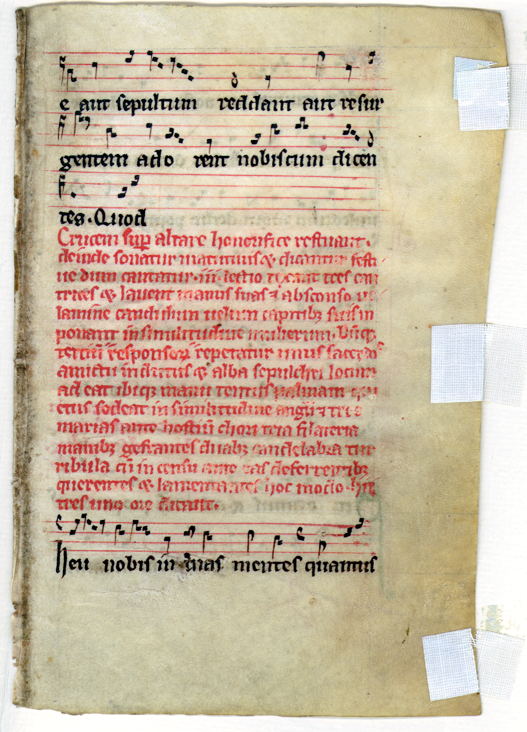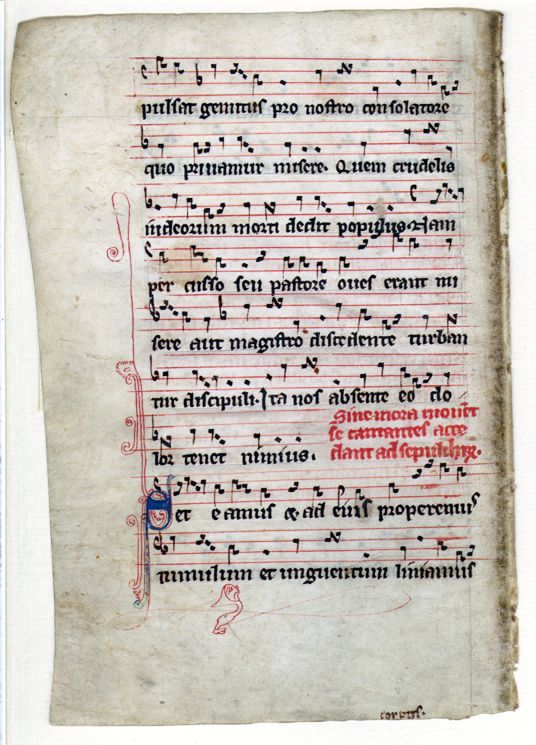Denison University Leaf 08
Otto Ege provided the following description for leaves from this manuscript:
Gradual (Graduale). England; Early 13th Century. Latin Text; Early Angular Gothic Script, Square Gregorian Notation.
Graduals are the books containing the chants for the celebration of the mass. English manuscripts of this early date and small size are rare. This volume, with the uncertain strokes in the script, seems to indicate that the transcriber was unaccustomed to writing in this small scale. There are four and five line staves, and the "F" and "C" lines are indicated. Most of the various foms of written notes can be found on each leaf of this book. Thos occurring more frequently are punctum (L. 'punctum', prick), a single note; virga (L. 'virga', rod), a square note with a thin line attached; podatus (L. 'pes', foot), two square notes, one above the other; climacus (L. 'climax', ladder), a virga note with two or more diamond shaped notes. There are other forms for particular nuances of expression.
There are more than 2,300 chants which have come down to us from the Middle Ages. The majority of these, however, can be reduced to a relatively few melodic types -- probably not exceeding fifty in all.
Size: 18 x 12 cm.
Text: Unidentified, but clearly part of the "Quem quaeritis" sequence (the discovery of the resurrection at Easter). In Ege's manuscript this leaf may have been near what is now Leaf 08 in the Cleveland Public Library portfolio.
 Denison Leaf 08 Recto
Denison Leaf 08 Recto
Denison University Leaf 08 Recto
 Denison Leaf 08 Recto Transcription
Denison Leaf 08 Recto Transcription
-e aut sepultum reddant aut resurgentem adorent nobiscum dicentes. Quod.
[15 lines of rubrication not yet transcribed.]
Heu nobis, internas mentes quanti
 Denison Leaf 08 Recto Translation
Denison Leaf 08 Recto Translation
A translation of this leaf is currently unavailable.
 Denison Leaf 08 Verso
Denison Leaf 08 Verso
Denison University Leaf 08 Verso
 Denison Leaf 08 Verso Transcription
Denison Leaf 08 Verso Transcription
pulsat gemitus pro nostro consolatore, quo privamur misere. Quem crudelis Iudeorum morti dedit populus.
Iam percusso seu, pastore, oves errant misere: aut magistro discedente turbantur discipuli, ita nos absente eo dolor tenet nimius.
[Rubrication not yet transcribed.]
Sed eamus et ad eius properemus tumulum; et unguentum liniamus
 Denison Leaf 08 Verso Translation
Denison Leaf 08 Verso Translation
A translation of this leaf is currently unavailable.